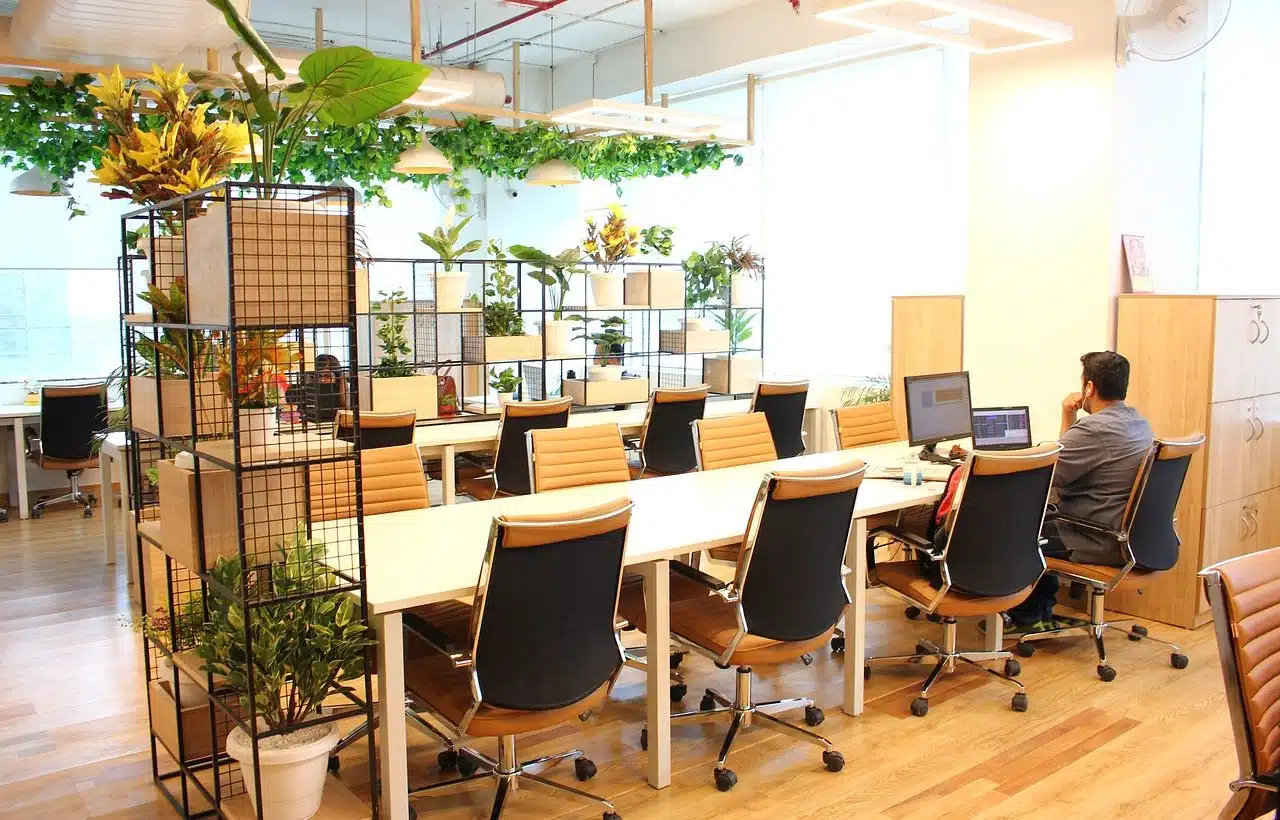
Various types of professionals can take advantage of the benefits of coworking.
Coworking is a work model in which independent professionals, entrepreneurs and small businesses have a shared space, instead of working in separate offices or from their homes ( teleworking ). This is also a flexible workspace, designed to offer a collaborative work environment, providing infrastructure such as desks, meeting rooms, high-speed internet connection and often additional services such as cafeterias, breakout areas and social events. networking.
The concept is based on the idea of creating a professional community where members can interact, share ideas, and collaborate on projects, which can lead to business opportunities and creative synergies. Coworking spaces are popular among freelancers, start-ups and remote workers looking for a more dynamic and social alternative to working alone.
Types of coworking
There are several types of coworking spaces, each designed to meet different needs and preferences of professionals and companies. Some of the most common types are described below.
Niche coworking
These spaces are specialized in a specific industry or professional group. For example, coworking for design, software development, artists or health professionals. They provide facilities and resources specific to the needs of that niche, as well as opportunities for active networking and collaboration within the same industry.
Corporate coworking
Large companies and corporations also use coworking spaces for their employees, especially those who work remotely or on temporary projects. They have an infrastructure similar to that of a corporate office, but with greater flexibility and a dynamic environment.
Innovation and start-ups coworking
It is also known as a business incubator or start-up accelerator . Offers additional resources such as mentoring , access to investors and creative workshop. Its goal is to create a favorable business ecosystem for rapid growth.
Rural coworking
Located in rural areas, they are spaces for those looking to work outside of big cities. They provide a quiet environment and the possibility of a better balance between productivity and personal growth , attracting professionals who value quality of life and nature.
Community coworking
Focused on creating a strong community spirit, these spaces promote a business culture of collaboration and mutual support. They offer regular activities and events, and foster personal and professional relationships between members.
High-end coworking
They offer a luxurious environment with premium services. They are aimed at executives, businessmen and professionals looking for an equipped and elegant office, with high-quality facilities and personalized services.
Coworking with a social focus
Dedicated to non-profit organizations, social enterprises and community projects. Its objective is to support initiatives that aim at social integration , offering reduced rates and additional resources for this type of projects.

The meeting room is one of the essential spaces in coworking.
Advantages of coworking
Coworking offers numerous advantages that make it an attractive option for freelancers, entrepreneurs, small businesses, and even large corporations.
open office
Encourages interaction and collaboration between members. This design eliminates physical barriers and facilitates communication, allowing people to share ideas and work together more efficiently. The open office creates a dynamic environment where it is easy to connect with other professionals , which can lead to new business opportunities.
Creative atmosphere
Inspiring interior design encourages creativity and innovation . With attractive common areas, stimulating decorations and spaces dedicated to relaxation (rest area) and recreation, these environments boost productivity and the generation of ideas (generally, through brainstorming ). Regularly organized events and workshops also allow members to learn and grow professionally.
Schedule flexibility
Unlike the rigidity of traditional offices, coworking spaces allow members to choose their own work schedules . This is especially beneficial for those who have irregular schedules or who need to balance their personal and professional responsibilities. The ability to access the workspace 24/7 provides great freedom to work when it is most convenient.
Diversity of talents
Coworking spaces bring together a wide variety of professionals from different industries and disciplines. This diversity of talent creates a rich environment where it is possible to learn from the experiences and skills of others . Additionally, interacting with people from diverse backgrounds can inspire new ideas and approaches, and facilitate collaboration on multidisciplinary projects. The network of contacts that is formed in a coworking space can be a valuable resource for any professional.
Sustainable office
Many coworking spaces are committed to sustainable and eco-friendly practices. From the design of the space with recycled materials to the implementation of energy saving and waste management systems, these sustainable offices seek to reduce their environmental impact . Furthermore, by sharing resources and infrastructure, they help minimize individual consumption, contributing to a more responsible and environmentally friendly work model .

The digital nomad, who works while traveling the world, is an ideal coworking client.
Coworking and technology
Below we outline several ways technology enhances the coworking experience, and why it plays a crucial role in their success and efficiency.
cutting-edge technology
To meet the needs of modern professionals . This includes high-speed internet , 3D printing area, wireless charging stations and advanced security systems. The availability of these technologies allows members to work more efficiently and access tools they may not have in their traditional offices or homes.
Virtual office
It allows professionals to work remotely while maintaining a prestigious business address. Includes mail handling, telephone answering, and occasional access to meeting rooms. The virtual office is especially useful for companies that want to have a presence in multiple locations without the costs associated with the in-person alternative.
digital nomad
Digital nomads are professionals who work remotely while traveling the world. Coworking spaces are designed to accommodate these workers, providing a reliable, well-equipped place where they can work regardless of their location . Advanced technology and services like global connectivity allow digital nomads to stay productive and connected.
Online reservation
It allows coworking members to easily reserve different resources, such as a personal desk or a meeting room. Through an online management platform, users can view real-time availability and make reservations from anywhere . This system streamlines the strategic planning process and ensures that resources are used efficiently.
Virtual receptionist
A technological solution that provides customer service without the need for a physical receptionist. Using artificial intelligence and virtual assistants, coworking spaces can manage calls, messages and queries efficiently. This improves customer experience and reduces operating costs.
Collaborative software
Facilitates collaboration between members who may be working on joint projects. Tools like Slack, Trello and Asana allow project management, team communication and task organization. These platforms make it possible for members to work together effectively, even if they are not physically in the same location.
Video conferencing
It allows members to communicate with colleagues and clients around the world. Advanced video conferencing equipment and specially equipped rooms guarantee high-quality virtual meetings, facilitating global collaboration and remote connection.
Virtual community
In addition to physical interaction, many coworking spaces foster an active virtual community . Through online platforms and private social networks, members can interact, share resources, and participate in virtual events.
